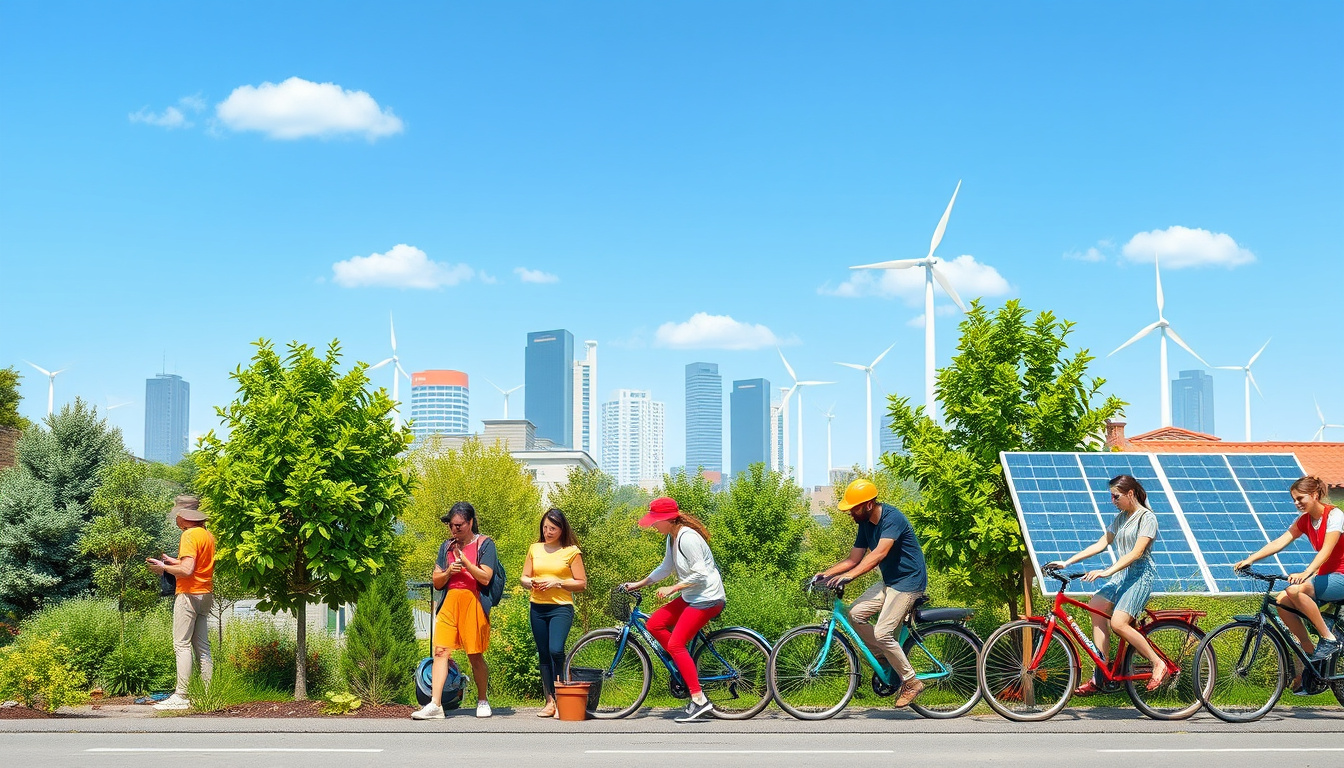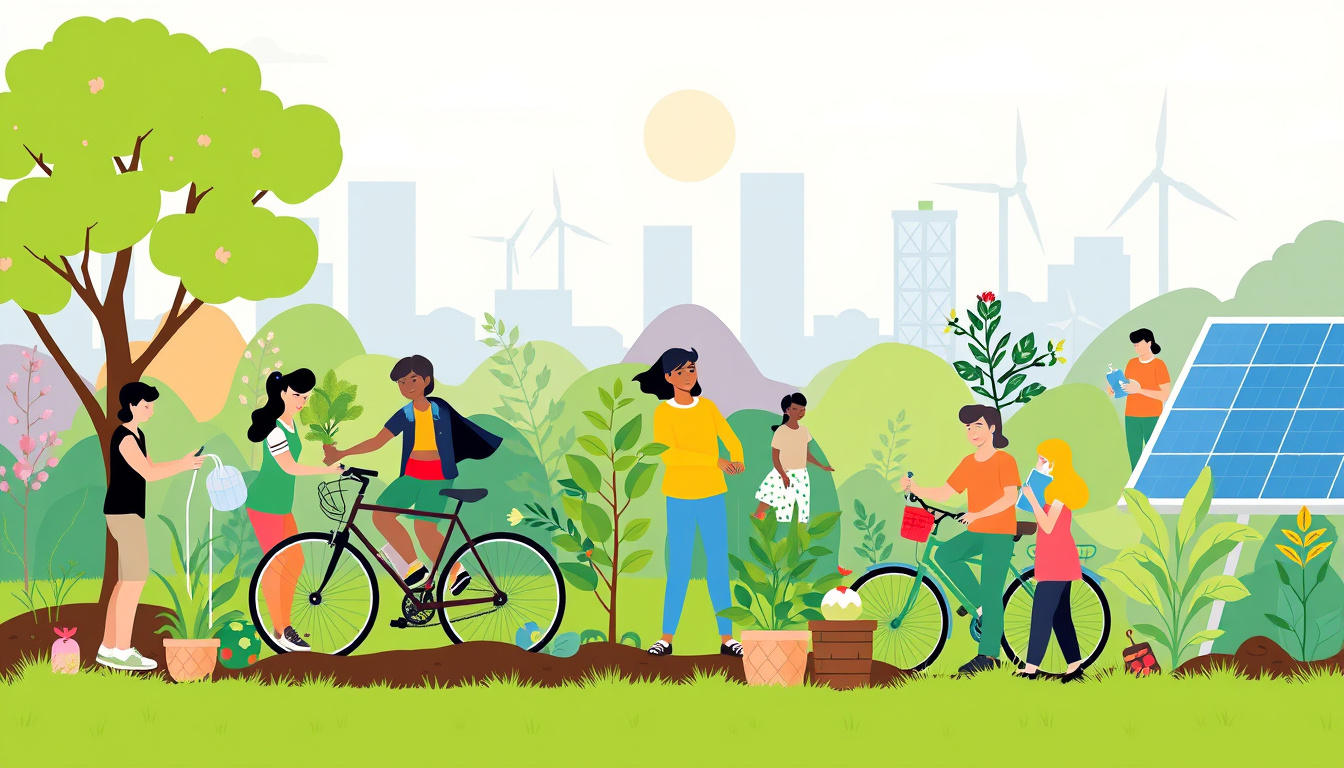Climate change is one of the most pressing issues of our time, affecting ecosystems, economies, and communities around the globe. As the consequences of climate change become increasingly apparent, individuals, businesses, and governments are seeking effective climate change solutions: what can we do now to mitigate its impact and foster a sustainable future? In this article, we will explore key strategies, including the adoption of renewable energy sources, improving energy efficiency, the importance of policy initiatives, and individual actions we can all take to combat climate change.

Key Takeaways
- Recognizing the urgency of climate change is essential for driving action.
- Transitioning to renewable energy sources is a critical step toward reducing carbon emissions.
- Improving energy efficiency can significantly lower energy consumption in both homes and businesses.
- Government policies play a crucial role in facilitating climate change solutions and promoting sustainable practices.
- Every individual can contribute to combating climate change through mindful actions and lifestyle changes.
Understanding Climate Change and Its Impact
Climate change refers to the long-term shifts in temperatures and weather patterns, primarily driven by human activities such as burning fossil fuels, deforestation, and industrial processes. As these activities increase the concentration of greenhouse gases in the atmosphere, the consequences are becoming alarming. Rising temperatures, extreme weather events, melting ice caps, and rising sea levels are just a few examples of the impacts we are beginning to experience. To combat climate change effectively, it is imperative to focus on climate change solutions: what can we do now? Individuals and communities can adopt energy-efficient practices, such as utilizing renewable energy sources, reducing waste through recycling and composting, and promoting sustainable transportation methods like biking and public transit. Governments and organizations also play a vital role, offering incentives for green energy use, implementing strict regulations on emissions, and investing in research and technology development. Together, through collective action and commitment, we can mitigate the catastrophic effects of climate change and create a more sustainable future.
Renewable Energy Sources: A Path Forward
Renewable energy sources are rapidly emerging as a pivotal element in the pursuit of climate change solutions: what can we do now to mitigate global warming and reduce our carbon footprint? As communities around the world embrace solar, wind, hydro, and geothermal energy, we are not just decreasing our dependence on fossil fuels; we are also fostering a more sustainable future. The urgent need for effective climate change solutions calls for innovative approaches to energy production and consumption. For instance, investing in solar energy can significantly lower greenhouse gas emissions, while harnessing wind power not only provides clean energy but also generates jobs and stimulates economic growth. Furthermore, transitioning to renewable energy sources can enhance energy security and reduce volatility in energy prices. In conclusion, as we face the challenges posed by climate change, adopting renewable energy sources stands out as one of the most impactful strategies available to us—an action we can embrace now for a cleaner, healthier planet.
‘The greatest threat to our planet is the belief that someone else will save it.’ – Robert Swan

Energy Efficiency in Homes and Businesses
Energy efficiency in homes and businesses plays a crucial role in addressing climate change, and exploring viable climate change solutions: what can we do now? By implementing energy-efficient practices, such as upgrading insulation, using energy-efficient appliances, and optimizing HVAC systems, both residential and commercial spaces can significantly reduce their carbon footprint. Simple changes, like switching to LED lighting and installing programmable thermostats, not only lower energy bills but also contribute to the larger goal of sustaining our planet for future generations. Furthermore, investing in renewable energy sources, such as solar panels, enhances energy independence and reduces reliance on fossil fuels. Each small step towards energy efficiency is a powerful contribution to the global fight against climate change, making it essential for homeowners and businesses alike to prioritize these improvements today.
The Role of Policy and Government Action
In the face of the escalating climate crisis, the role of policy and government action in implementing effective climate change solutions cannot be overstated. Governments hold the power to shape regulations, allocate funding, and spearhead initiatives that can collectively mitigate the adverse effects of climate change. By setting ambitious emission reduction targets, investing in renewable energy projects, and incentivizing businesses and individuals to adopt sustainable practices, policymakers can drive the necessary changes. Supporting international agreements, such as the Paris Agreement, further emphasizes the global commitment to reducing carbon footprints and protecting our planet. For anyone seeking actionable climate change solutions, understanding the synergy between grassroots efforts and robust governmental policies is essential. What can we do now? We can advocate for stronger climate policies, engage in community sustainability projects, and hold our leaders accountable to ensure that policy measures are enacted swiftly and effectively.

Individual Actions to Combat Climate Change
As the world grapples with the urgent challenge of climate change, individuals play a crucial role in implementing effective climate change solutions: what can we do now? Adopting sustainable practices in our daily lives can significantly contribute to the global effort. Simple actions such as reducing energy consumption, opting for public transportation or biking instead of driving, and increasing our usage of renewable energy sources can have a positive impact. Additionally, reducing waste by recycling, composting, and buying products with minimal packaging can help mitigate environmental effects. Engaging in community initiatives, such as tree planting and local clean-ups, fosters a collective effort toward a healthier planet. Ultimately, each person’s commitment to sustainable choices is essential in combating climate change and creating a more resilient future.
Frequently Asked Questions
What are some effective renewable energy sources to combat climate change?
Some effective renewable energy sources include solar, wind, hydroelectric, and geothermal energy. These sources help reduce greenhouse gas emissions by providing cleaner alternatives to fossil fuels.
How can individuals improve energy efficiency in their homes?
Individuals can improve energy efficiency by using energy-efficient appliances, sealing leaks and drafts, enhancing insulation, and utilizing smart home technologies to monitor and reduce energy consumption.
What role does government policy play in addressing climate change?
Government policy is crucial in fighting climate change as it sets regulations, provides incentives for renewable energy investments, and supports research and development of sustainable technologies, all of which can motivate broader societal changes.
What immediate actions can individuals take to contribute to climate change solutions?
Individuals can take immediate actions such as reducing car travel, opting for public transport or cycling, conserving water, reducing waste, and supporting local and sustainable products and companies.
Why is it important for everyone to get involved in climate change solutions?
It is important for everyone to get involved because climate change is a global issue that affects us all, and collective actions can lead to significant changes. By participating, individuals can help drive awareness, influence policies, and contribute to a more sustainable future.

Leave a Reply